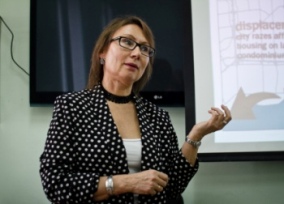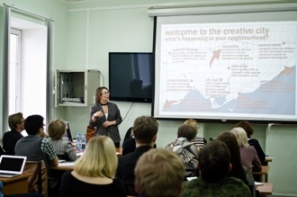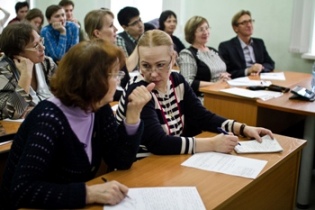‘Theory of cities’, a course taught by Elena G. Trubina
 On November the13th, 14th and 16th, 2013, Elena G. Trubina, Professor at the Department of social philosophy (Ural Federal University, Yekaterinburg), Dr.Sc. (Philosophy), gave open lectures under the title ‘Theory of cities’ at the TSU LSAR. Her research interests include the issues of identity and identification, post-socialist culture, actors and urban space, social theory and methodology of interdisciplinary research. Elena Trubina has authored and coauthored research publications in the field of epistemology and methodology of science, social philosophy, and urban studies. Among those is her best-selling book ‘City in Theory: Essays on Urban Space’ (2011).
On November the13th, 14th and 16th, 2013, Elena G. Trubina, Professor at the Department of social philosophy (Ural Federal University, Yekaterinburg), Dr.Sc. (Philosophy), gave open lectures under the title ‘Theory of cities’ at the TSU LSAR. Her research interests include the issues of identity and identification, post-socialist culture, actors and urban space, social theory and methodology of interdisciplinary research. Elena Trubina has authored and coauthored research publications in the field of epistemology and methodology of science, social philosophy, and urban studies. Among those is her best-selling book ‘City in Theory: Essays on Urban Space’ (2011).
Over 70 people attended the lectures in order to get familiar with Elena Trubina’s observations of and thoughts on the dynamics of and prospects for the development of cities across the world. Among the participants were university faculty and students of TSU departments of history, philosophy, psychology, and journalism, the Higher School of Business and Institute of Arts and Culture, along with other universities and Tomsk organizations’ representatives – Tomsk Polytechnic University, Tomsk State University of Architecture and Building, Tomsk State University of Control Systems and Radio Electronics, Tomsk State Pedagogical University, and the portal “Globalsib.com”.
 The lectures by E. Trubina were dedicated to the difficulties in the interaction of social theory and urban space. Cities are the main area, in which social changes take place and are the key area where social theory, including anthropology, is produced. Thus, one need to understand how modern cities are connected with modernity, post-modernity, capitalism, and globalization, that is to look for the connection between large-scale social processes and urban transformations.
The lectures by E. Trubina were dedicated to the difficulties in the interaction of social theory and urban space. Cities are the main area, in which social changes take place and are the key area where social theory, including anthropology, is produced. Thus, one need to understand how modern cities are connected with modernity, post-modernity, capitalism, and globalization, that is to look for the connection between large-scale social processes and urban transformations.
Three main components of such a connection are: first, macroeconomic trends such as de-industrialization, neoliberalism, individualization, and commodification of relations which get embodied in such urban processes as the enhancement of space segregation, unemployment, and the crisis of local relationships; second, the integration of cities in the global economy with some accompanying activities of international financial and trade organizations, combined with the changes in overall state policy (namely, the reform of social management), which is often manifested in the increased dependence of cities on  national, supranational, and global forces; third, the inequality of cities – the competition and interdependence lead to some cities benefitting from that and becoming a pole of attraction of resources, investments, and the symbolic content of life, whereas the other ones have to come to terms with their position of outsiders. Along with outsiders-cities there are outsiders-people, towards which more successful city dwellers exercise the ‘symbolic violence’ (Pierre Bourdieu), thus reproducing the power discourse and neoliberal ideology. Also considered were the ways of counteracting this reproduction of social inequality in words and actions of city residents and authorities.
national, supranational, and global forces; third, the inequality of cities – the competition and interdependence lead to some cities benefitting from that and becoming a pole of attraction of resources, investments, and the symbolic content of life, whereas the other ones have to come to terms with their position of outsiders. Along with outsiders-cities there are outsiders-people, towards which more successful city dwellers exercise the ‘symbolic violence’ (Pierre Bourdieu), thus reproducing the power discourse and neoliberal ideology. Also considered were the ways of counteracting this reproduction of social inequality in words and actions of city residents and authorities.
Check out the mass media reports below to learn more about Elena Trubina’s lectures:
The anthropologist and urbanist Elena Trubina on cities of East and West
Interview with Professor Elena G. Trubina on the ‘Echo of Moscow’ radio (Tomsk)





 The project "Man in a Changing World. Identity and Social Adaptation: Past and Present" is funded by the Russian Government
The project "Man in a Changing World. Identity and Social Adaptation: Past and Present" is funded by the Russian Government 